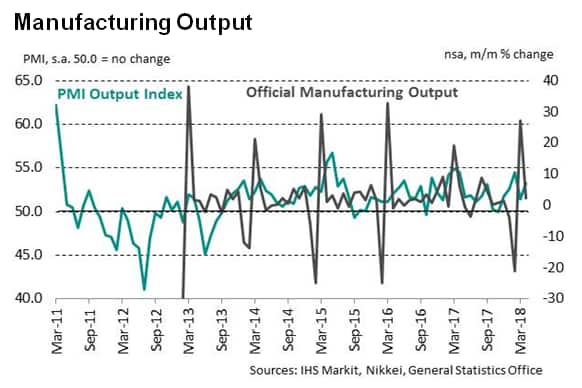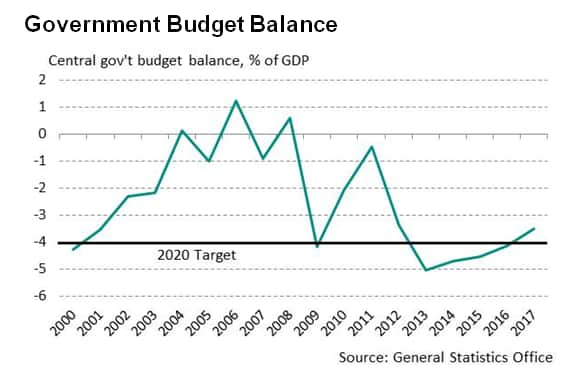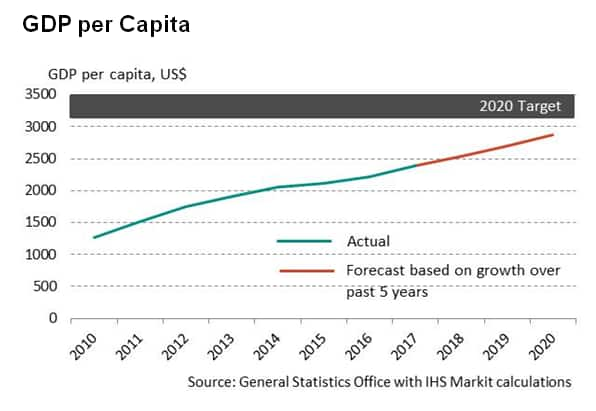Customer Logins
Obtain the data you need to make the most informed decisions by accessing our extensive portfolio of information, analytics, and expertise. Sign in to the product or service center of your choice.
Customer Logins
ECONOMICS COMMENTARY
May 18, 2018
Vietnam makes progress towards achieving economic plans
- GDP growth within target range, with labour productivity growth above target
- GDP per capita among those goals looking difficult to meet
- Manufacturing PMI signals ongoing strength in industrial sector
As Vietnam reaches the halfway point in its latest five-year cycle, a number of the goals set out by the government in early-2016 look set to be achieved by 2020, helped by a strong economic performance over the past two years. Particularly promising are targets being met for GDP growth and labour productivity. That said, there are still some areas which are looking trickier, such as GDP per capita. This note analyses how the economy is performing with regards to the five-year targets.
GDP growth matching expectations
The government's headline target revolves around GDP growth, and trends here look promising. The Vietnamese government aims for expansions averaging between 6.5% and 7.0% over the 2016-2020 period. Vietnam was one of the fastest-growing economies in the world in 2017 with growth of 6.8%, and official data signalled a 7.4% annual increase in output in the first quarter of 2018. IHS Markit currently forecasts growth of 6.7% for the year as a whole, suggesting that the overall target is within reach.
Overall GDP has been boosted by a strong performance of the industrial sector, backing up the trends signalled by the Nikkei manufacturing PMI, compiled by IHS Markit. PMI data have signalled rises in manufacturing output in all but one month over the past year-and-a-half amid strong and sustained new order growth. The survey responses indicate that the competitiveness of Vietnamese firms has enabled them to take advantage of a supportive global economic environment to secure greater volumes of new export orders. In fact, April saw growth of new business from abroad quicken to a six-month high.

The strong performance of the economy in 2017 meanwhile helped to bring the government's budget deficit below its 4% target for the first time in five years.

Other targets which look set to be met are those on labour productivity and social investment capital, with the productivity of Vietnamese workers improving particularly sharply (see Appendix for more details).
GDP per capita below target
Not all of the targets look set to be achieved, however. The proportion of GDP accounted for by industry and services remains below target as agriculture continues to be a key sector. Linked to this, the rate of urbanisation is also failing to rise at the desired pace.
Despite GDP growing strongly, the increase in part reflects population growth, and the level of GDP per capita looks set to undershoot the target. That said, the pace of increase has accelerated in each of the past two years, providing hope that the goal could still be achievable within the government's time-frame.

In summary, halfway through the five-year period, the Vietnamese economy looks on track to meet at least some of the goals set out by the government in 2016. Given the openness of the Vietnamese economy to foreign trade and investment, much will depend on how the global economy performs over the next two-and-a-half years. Therefore, IHS Markit's global PMI data, including the Nikkei Vietnam Manufacturing PMI, will provide timely health checks.

Purchasing Managers' Index™ (PMI™) data are compiled by IHS Markit for more than 40 economies worldwide. The monthly data are derived from surveys of senior executives at private sector companies, and are available only via subscription. The PMI dataset features a headline number, which indicates the overall health of an economy, and sub-indices, which provide insights into other key economic drivers such as GDP, inflation, exports, capacity utilization, employment and inventories. The PMI data are used by financial and corporate professionals to better understand where economies and markets are headed, and to uncover opportunities.
© 2018, IHS Markit Inc. All rights reserved. Reproduction in whole or in part without permission is prohibited.
{"items" : [
{"name":"share","enabled":true,"desc":"<strong>Share</strong>","mobdesc":"Share","options":[ {"name":"facebook","url":"https://www.facebook.com/sharer.php?u=http%3a%2f%2fwww.spglobal.com%2fmarketintelligence%2fen%2fmi%2fresearch-analysis%2fvietnam-makes-progress-towards-achieving-economic-plans.html","enabled":true},{"name":"twitter","url":"https://twitter.com/intent/tweet?url=http%3a%2f%2fwww.spglobal.com%2fmarketintelligence%2fen%2fmi%2fresearch-analysis%2fvietnam-makes-progress-towards-achieving-economic-plans.html&text=Vietnam+makes+progress+towards+achieving+economic+plans+%7c+S%26P+Global+","enabled":true},{"name":"linkedin","url":"https://www.linkedin.com/sharing/share-offsite/?url=http%3a%2f%2fwww.spglobal.com%2fmarketintelligence%2fen%2fmi%2fresearch-analysis%2fvietnam-makes-progress-towards-achieving-economic-plans.html","enabled":true},{"name":"email","url":"?subject=Vietnam makes progress towards achieving economic plans | S&P Global &body=http%3a%2f%2fwww.spglobal.com%2fmarketintelligence%2fen%2fmi%2fresearch-analysis%2fvietnam-makes-progress-towards-achieving-economic-plans.html","enabled":true},{"name":"whatsapp","url":"https://api.whatsapp.com/send?text=Vietnam+makes+progress+towards+achieving+economic+plans+%7c+S%26P+Global+ http%3a%2f%2fwww.spglobal.com%2fmarketintelligence%2fen%2fmi%2fresearch-analysis%2fvietnam-makes-progress-towards-achieving-economic-plans.html","enabled":true}]}, {"name":"rtt","enabled":true,"mobdesc":"Top"}
]}




